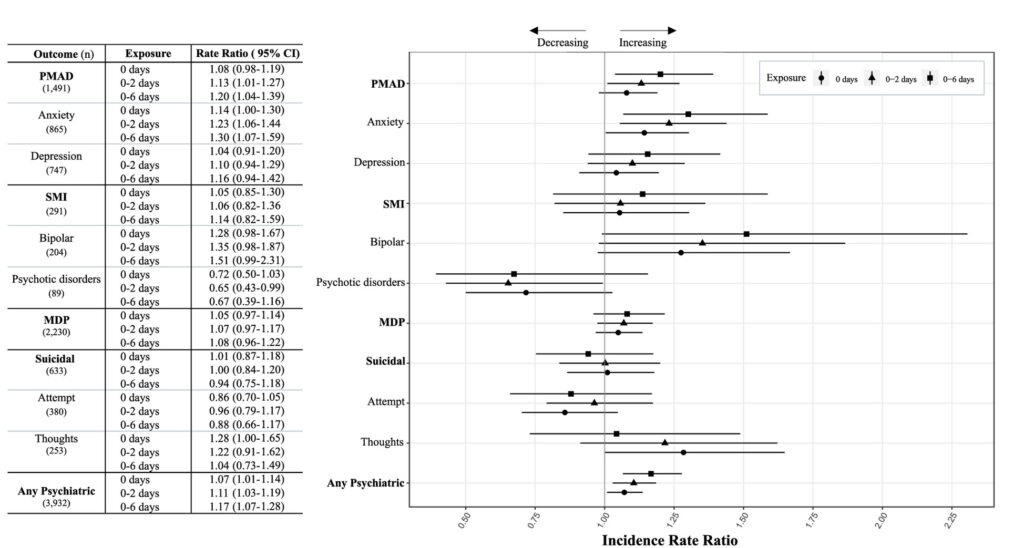Short-term exposure to extreme heat is associated with mental health problems during pregnancy, according to a new paper from NCICS researcher Dr. Jennifer Runkle and colleagues. The study adds to a large and growing body of evidence documenting the health risks associated with climate change in general and high temperatures in particular.
July 22, 2024 — Mark Essig
Researchers have long known that extreme heat is associated with cardiorespiratory problems and other physical health conditions. Over the past decade, the risks to mental health have become clear as well. Studies have shown, for example, that warm temperatures increase risk for emergency department (ED) visits for depression, anxiety, bipolar disorder, suicidal ideation, and other psychiatric problems.
“What puts our study on the map is that we look at the issue of heat and mental health in relation to pregnant people,” Runkle said. “We’re the first to show an increased risk for pregnant populations to visit the ED with a range of psychiatric conditions.”
Runkle’s coauthors include Charlie Reed of NCICS, Dr. Maggie Sugg of Appalachian State University, and Dr. Anne Berry of Duke University.
The study, recently published in Environmental Health Perspectives, examined 206,000 psychiatric emergency department visits for pregnant patients in North Carolina during the warm season (May to September) for the years 2016 through 2019.
The signal was clear: the more temperatures rose, the more pregnant women were admitted to the ED for mental health issues. For instance, a 5°C (9°F) rise in temperature was associated with a 7–15% increase in the number of emergency department visits for prenatal psychiatric conditions.
“It’s a linear scale,” Runkle said. “For every incremental increase in temperature, you have a parallel increase in health risk.”

Figure 1. Forest plots of the estimated incidence rate ratios (IRR) and 95% confidence intervals (CI) for the association between a 5°C increase in ambient temperature and psychiatric emergency department (ED) visits from conditional logistic regression models during pregnancy in the warm season (May to September, 2016–2019) for the following conditions: perinatal mood and anxiety disorders (PMAD), severe mental illness (SMI), mental disorders of pregnancy (MDP), suicidality (SUIC), and any psychiatric disorder. ? = total number of cases. An IRR>1 suggests ambient temperature increases psychiatric risks during pregnancy.
The greatest risk for pregnant women occurred following cumulative exposure to hot temperatures in the week before hospital admission. Residents of urban areas faced increased risk.
“This is a socially and economically vulnerable population, with the majority being on Medicaid,” Runkle said. “These women face significant challenges in accessing stable housing, adequate healthcare, and other essential services.” These challenges could leave them vulnerable to the extreme heat, while limited income could restrict their access to air conditioning.
“Climate doesn’t operate in a vacuum,” she added. “It aggravates and amplifies existing social stressors.”
The study revealed no differences in psychiatric risks across the trimesters of pregnancy, although Runkle noted that this may be because the medical records often failed to note the patient’s trimester.
Even in the absence of hot weather, pregnancy is a vulnerable time for mental health. “During pregnancy you see a large uptick in new mental health diagnoses for conditions like mood and anxiety disorders,” Runkle said.
And a pregnant woman’s health also affects her child: children of mothers with mental health conditions face higher risks of behavioral, emotional, and developmental disorders. These can include conditions such as anxiety, depression, attention-deficit/hyperactivity disorder, and difficulties with social interactions and cognitive development. “Mental health diagnoses in mothers profoundly impact both the mother and the child later in life,” Runkle said.
The links between pregnancy and mental health are a key interest for Runkle. She coauthored a recent PLOS Mental Health study demonstrating that recurrent exposure to multiple hurricanes increased the risk of psychiatric illness among pregnant Medicaid beneficiaries. And in an earlier study she and her coauthors showed that mental health conditions significantly increase the risk of pregnancy complications such as severe maternal morbidity, preterm birth, and hypertensive disorders of pregnancy, as well as infant complications including low birth weight. Those results demonstrate the escalating burden of mental disorders during pregnancy.
The new study indicates that a warming climate poses additional risks.
“Women with new or existing mental health conditions who are also pregnant may be particularly sensitive to extreme heat,” Runkle said. “This needs to be on the radar of providers, so women can get the help they need.”
Runkle, J.D., M.M. Sugg, A. Berry, C. Reed, K. Cowan, L. Wertis, and S. Ryan, 2024: Association of psychiatric emergency visits and warm ambient temperature during pregnancy: A time-stratified case-crossover study. Environmental Health Perspectives, 132 (6), 067001. https://doi.org/10.1289/EHP13293
Media Contact
Tom Maycock
Science Public Information Officer
NC State University’s North Carolina Institute for Climate Studies
tmaycock@ncics.org
828-271-4272
